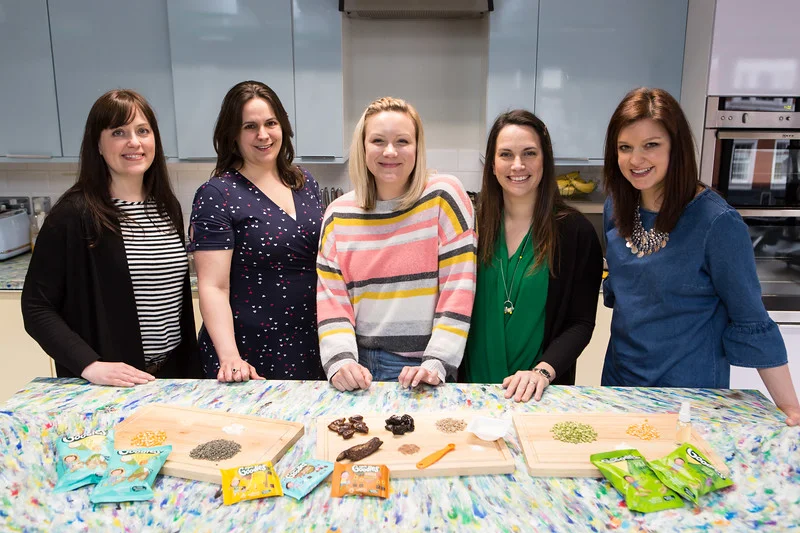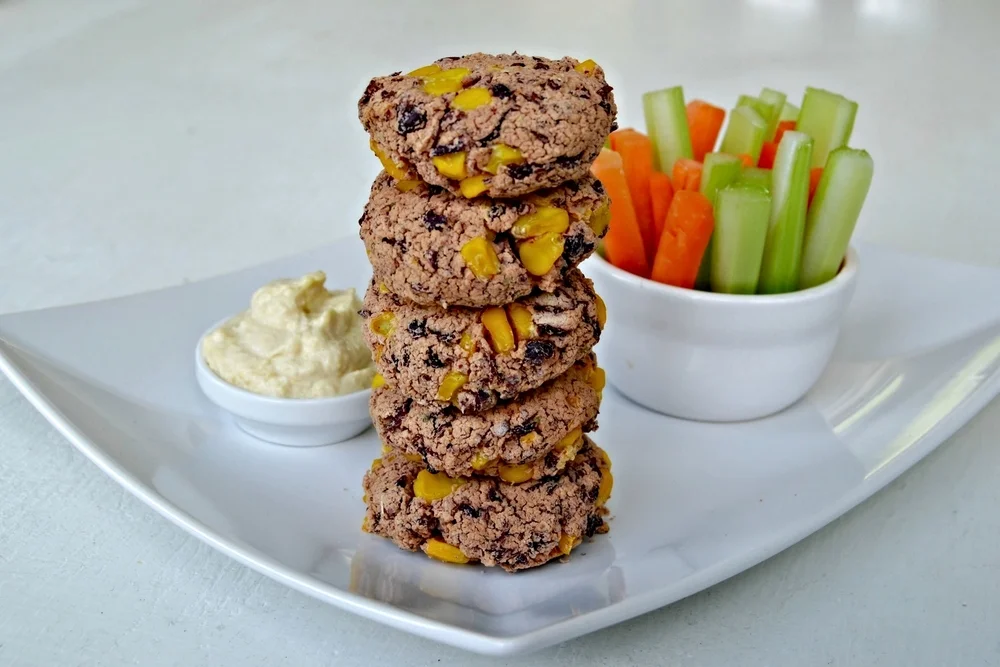Healthy Snacking for Toddlers with Organix #FoodYouCanTrust
I had a really fantastic time down in Bournemouth at Organix HQ recently at their 'Junk Busters' event. Along with other bloggers, I heard Emily Day, Food Development Manager for Organix, and Dr Frankie Phillips, Nutrition Advisor for Organix, discuss the role and importance of snacking for toddlers. It was a very interesting day - a real eye opener - and I'm passionate about sharing all the things I learned.
L-R: Kate from Veggie Desserts, Grace from Eats Amazing, Molly from from Mother's Always Right, Mel from Le Coin de Mel and myself ©Barbara Evripidou/FirstAvenuePhotography.com
Little Ones Need Snacks
Frankie explained how toddlers need 2-3 healthy snacks each day because their little tummies aren't big enough to take in all the energy and nutrients they need for growth & development from just three square meals. There's absolutely nothing naughty about eating in-between meals when you're little - it's essential!
Frankie said we need to consider 'nutrient density' when giving snacks to our toddlers and go for foods that are rich in nutrients for the number of calories contained. For example, an oatcake (or even an oat-based biscuit) will provide more fibre and vitamins than a piece of shortbread, and cheese & crackers are much better nutritionally than a bag of crisps.
Snacks vs Treats
Frankie explained the difference between a snack and a treat and that they should not be considered the same thing. She suggests 2-3 healthy snacks per day, and 2-3 treats a week (e.g. ice cream). Treats are a good thing, in moderation. We shouldn't deprive ourselves or cut things out completely - we need to have a healthy relationship with food.
Emily Day - Food Development Manager for Organix ©Barbara Evripidou/FirstAvenuePhotography.com
Healthy Snacking Beyond Fruit
Snacks provide energy as well as nutrients that we can't always get into our little ones at mealtimes. The best snacks for toddlers are those that are high in protein and fibre and low in salt, 'free' sugar and saturated fat.
When we think of a healthy snack, we think fruit. However, Frankie explained that fruit, while extremely, doesn't have a wide range of macro nutrients or many calories for growing little ones on the go. We need to give our toddlers dairy-based, fibre-based, protein-based as well as fruit & vegetable based snacks.
Frankie suggested we think of the eatwell plate when making snacks as well as meals. Apples dipped in peanut butter are a good source of protein and un-saturated fat. Wholewheat crackers spread with cream cheese provide fibre as well as calcium. Carrot sticks are far more substantial when served with houmous, a source of protein & carbohydrates.
©Barbara Evripidou/FirstAvenuePhotography.com
About 'Free' Sugar
The definition of 'free' sugar is any sugar that has added, to food, that isn't naturally present. This includes honey and other syrups. The WHO recently commissioned this report which recommended the maximum daily free sugar intake per day for 4-6 year olds should be no more that 5 teaspoons. For toddlers, that's even less.
It's worth knowing that natural fruit juice, and fruit smoothies (even homemade) contain free sugar, even though whole pieces of fruit do not. This is because blending & juicing breaks down the insoluble fibre in the fruit and releases the fructose (this is the type of sugar present in fruit) in the cells. The fibre we consume when eating a whole piece of fruit slows the absorption of fructose, and makes us feel full. On the other hand juices & smoothies are absorbed immediately as the fibre has been removed - just like any other sugary drink.
Dr Frankie Phillips - Nutrition Advisor for Organix ©Barbara Evripidou/FirstAvenuePhotography.com
Facts On Salt
Frankie explained that we need some salt in our diets for our muscles and nerves and also to give cells the right environment to do their jobs properly. Salt is even present in breastmilk in very small amounts, so babies get the salt they need before weaning. Salt is present naturally in food, such as meat & cheese, so we can actually get enough salt in our diets without adding more when cooking or at the table.
How much salt should little ones be having?
From weaning up to 12 months: Babies should have no more than 1g of salt (0.4g of sodium) per day.
Between 1 – 3 years: For toddlers the maximum amount of salt per day is 2g (0.8mg), that’s less than half a teaspoon.
These amounts include any salt present in foods (such as bread, cheese), not just salt added at home
The danger of too much salt:
Too much salt can cause damage to immature kidneys in little ones.
Over time, if babies or toddlers are given salty foods they develop and learn a preference for salty tastes and this can lead to eating too much salt, and consequences even in adult health.
In adults a high salt intake is associated with high blood pressure and an increased risk of strokes and heart attacks.
Some baby finger foods and toddler snacks contain as much salt as adult crisps ©Barbara Evripidou/FirstAvenuePhotography.com
Tips for Snacking Out & About
It's shocking that some baby finger foods and toddler snacks contain almost the same level of salt as a regular bag of adult crisps and that extra salt is added to some baby and toddler snacks to boost the flavour. I wrote more about this in my last post, but we're talking about products marketed at babies & toddlers. There's currently no legislation in place to prevent this.
This means that well meaning parents, in a hurry trying to make good choices for their kids, can grab a seemingly 'child friendly' snack which is actually quite unhealthy. However, if we take a moment to flip over to the back of the pack and read the ingredients list, there's a few things we can look out for to avoid falling into this trap:
Avoid really long ingredient lists in shop bought snacks.
Avoid unrecognisable ingredients.
Avoid added ingredients such as sugar, salt or flavourings.
This video with Cherry Healey, who is working with Organix on the #FoodYouCanTrust campaign, explains this further.
New Healthy Snacks from Organix
Emily Day, Food Development Manager for Organix, gave us a sneak preview of the latest Organix Goodies Snacks. All Organix snacks come with their 'No Junk Promise' – reassurance that they have been made to the highest standard with organic ingredients and nothing unnecessary.
Emily spent two and a half developing two new pulsed-based savoury snacks - Cheese & Onion Lentil Hoops and Cheesy Pea Snaps. Cheese & Onion Lentil Hoops contain just five ingredients - lentils (65%), corn, cheese powder, onion powder and a little sunflower oil. Cheesy Pea Snaps are made from just four ingredients - peas (65%), corn, cheese powder and a little sunflower oil. All the ingredients are organic and there's nothing unnecessary.
Emily Day - Food Development Manager for Organix ©Barbara Evripidou/FirstAvenuePhotography.com
Cheese topped the flavour polls for savoury toddler snacks, hence the cheesy theme! Emily shared that the inspiration for Cheesy Pea Snaps came from her sister who used to eat cheese and pea sandwiches when she was little!
Organix are also launching Pea Puffs - finger food suitable for weaning babies which contain just two ingredients peas and corn. They are blander and more of a chunky shape for little fingers.
Emily Day - Food Development Manager for Organix ©Barbara Evripidou/FirstAvenuePhotography.com
Organix Goodies Fruit & Seed Bites are also coming soon in a choice of three delicious flavours - Cocoa, Banana & Cocoa, and Coconut & Cocoa. They're made from dried fruit, seeds and cocoa - a fun and nutritious alternative to dried fruit, and a great way to get little ones to eat seeds!
Again, they're made from ingredients that parents will recognise - dates, prunes, sunflower seeds, pure cocoa powder, vanilla extract, banana and coconut. All the ingredients are blended together for a great taste, a soft chewy texture and shaped into individual bite sized cubes. Everything is organic and there's no added sugar. The coconut flavour is my personal favourite.
Molly Forbes & Emily Day ©Barbara Evripidou/FirstAvenuePhotography.com
Emily said “We really think about the shape, texture and the taste when developing snacks for little fingers and tummies. Ingredients are carefully selected for their flavour and nutritional benefits, to give mums and dads foods they can trust. We get real flavour by using great ingredients, so there’s no need for any added flavourings or salt.”
I made a little video of my boys (Joshua 9, Daniel 7 & Isaac 2) trying the new Organix Goodies snacks for the first time. They were a real hit. Isaac was nuts about the fruit & seed bites, which he was not keen on sharing with his brothers!
Over To You
I'd love to hear your thoughts on some of the hardest places to find healthy snacks when out and about with your little ones. For me it's coffee shops and soft play centres - places that are full of young mums yet little on offer in terms of healthy snacks for toddlers.
Comment below or share your findings using the hashtag #FoodYouCanTrust online.

































